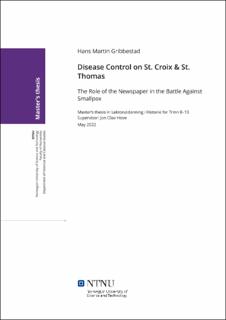| dc.contributor.advisor | Hove, Jon Olav | |
| dc.contributor.author | Gribbestad, Hans Martin | |
| dc.date.accessioned | 2022-07-08T17:21:59Z | |
| dc.date.available | 2022-07-08T17:21:59Z | |
| dc.date.issued | 2022 | |
| dc.identifier | no.ntnu:inspera:111531931:22997307 | |
| dc.identifier.uri | https://hdl.handle.net/11250/3004234 | |
| dc.description.abstract | Koppervaksinen kom til de danske koloniene i Karribien i 1803. Myndighetene svarte umiddelbart med å igangsette strategier for å få befolkningen, som i all hovedsak besto av slaver, gjennomvaksinert. Denne master oppgaven vil utforske disse strategiene og de konkrete virkemidlene brukt i kampen mot kopper, derav finne ut av hvilken rolle avisene spilte i denne prosessen. Arbeidet mitt går dermed inn på tema og konsept som slaveri og medisin, samt statlig kontroll og maktutøvelse i relasjon til kopperpandemien. Forskningen min har basert seg på kvalitativ analyse av aviser utgitt fra 1803 til de første tiårene etter frigjøringen av slavene på øyene i 1848. Videre har jeg gjennomført en kvantitativ studie av vaksinasjonsprotokollene som er digitalisert og utgitt av det Danske Rigsarkivet. Funnene mine tilsier at avisenes rolle utviklet seg i takt med endringene som skjedde på øyene i dette tidsrommet. Videre viser forskningen at frigjøringen i 1848 ble et viktig skifte i hvordan vaksinasjonskampanjer ble gjennomført og hvilken innflytelse og rolle avisene hadde i å opprettholde kontroll på viruset. | |
| dc.description.abstract | The smallpox vaccine first arrived on the Danish Virgin Isles in 1803. The authorities on the islands immediately began to form a strategy for the vaccination of the inhabitants, that mostly consisted of enslaved workers. This thesis will examine the strategies and measures used in the vaccination campaigns and in doing so evaluate what role the newspapers had in the execution of these strategies. My research thus focuses on the concepts of slavery, medicine, governmental control, and exercise of power in relation the smallpox pandemic. My study is based on a qualitative study of newspaper articles released on St. Croix and St. Thomas between the arrival of the vaccine in 1803 and the first few decades after the emancipation of the enslaved on the islands in 1848. This is supplemented by a quantitative study of vaccination protocols provided by the Danish National Archives. My findings suggests that the newspapers’ role changed during this period, reflecting developments occurring on the island. They also suggest that the emancipation was a major turning point in the vaccination campaigns and the newspapers’ role in maintaining disease control. | |
| dc.language | eng | |
| dc.publisher | NTNU | |
| dc.title | Disease Control on St. Croix & St. Thomas: The Role of the Newspaper in the Battle Against Smallpox | |
| dc.type | Master thesis | |
